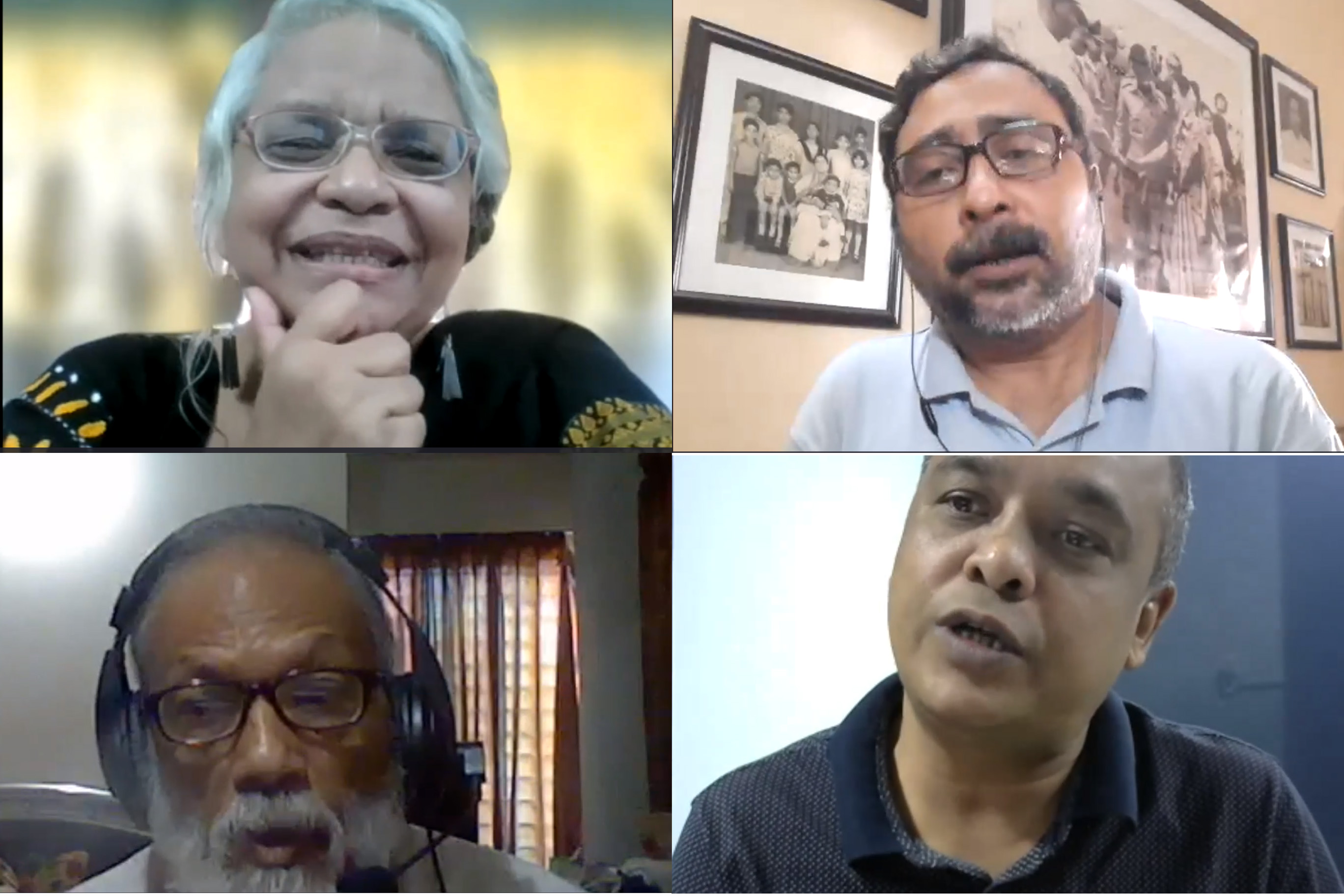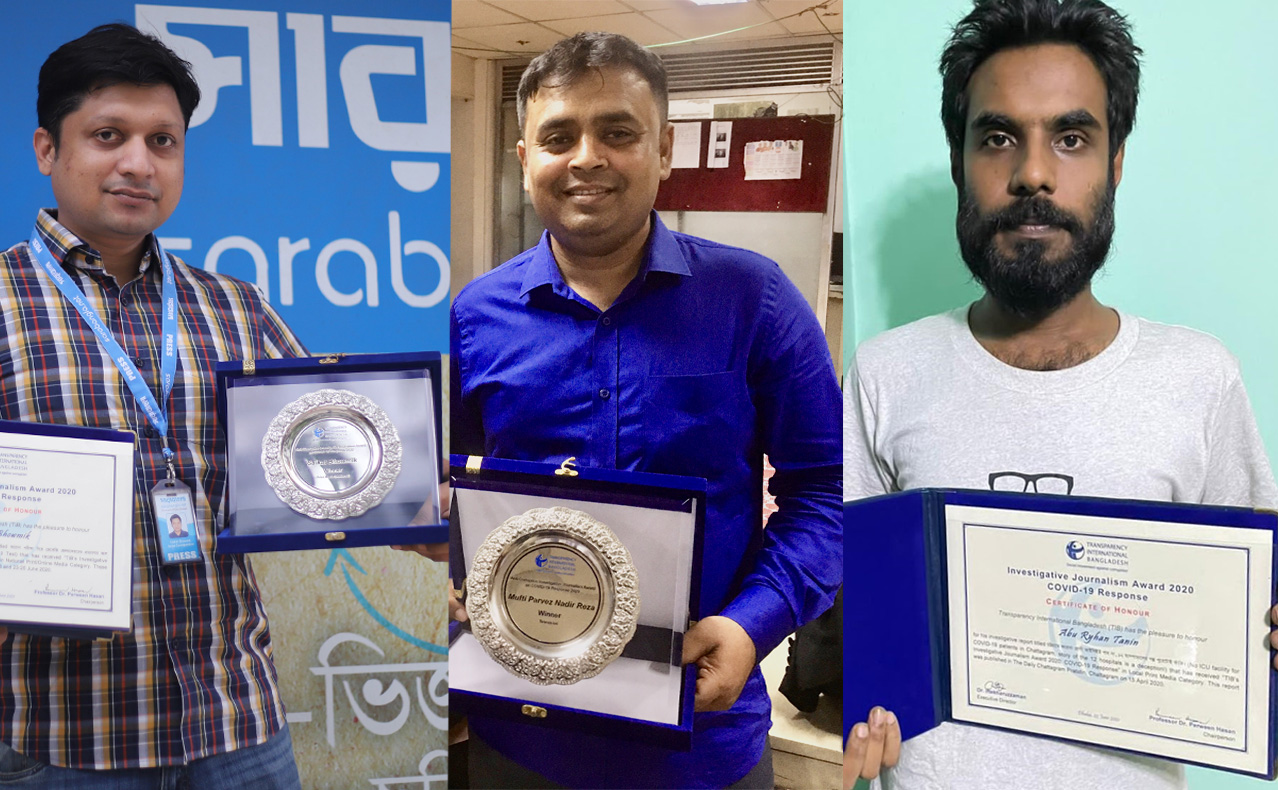Published: 22 June 2021

The magnitude of internal and external pressure in investigative journalism has increased due to expanded absolute political influence, said speakers at a virtual discussion today.
Therefore, maintaining journalistic ethics and showing courage is more relevant than ever before in investigative journalism's trying times to deal with the pressure, they opined.
They also talked about the roles of journalists and media organisations in ensuring the professional safety of the journalists by maintaining the integrity and practising ethics.
On June 22, 2021, TIB organised the virtual discussion titled Challenges of Investigative Journalism during Covid-19 and the way forward, followed by an award ceremony titled Investigative Journalism Award 2020: Covid- 19 Response ’. TIB Outreach and Communication (O&C) Director Sheikh Manjur-E-Alam moderated the session.
Earlier of the ceremony, TIB O&C Assistant Coordinator Masum Billah presented the keynote paper suggesting ten recommendations, including ensuring free flow of information, revoking the Digital Security Act 2018 and the Official Secrets Act 1923, and making the Press Council more effective.
Speaking at the programme, TIB Executive Dr. Iftekharuzzaman said the National Integrity Strategy of the country has some guidelines on how the mass media will run maintaining integrity; however, it isn’t enough to tackle internal and external challenges in journalism.
“If the media organisations practice ethics individually and collectively, it is possible to tackle internal challenges. And in the case of external challenges, the environment of investigative journalism depends on the political context of the country concerned. Similarly, it is also applicable to our country,” he said.
“The main theme of our political culture is the 'Zero-Sum Game', which means 'must-win or stay in power'! For this, the political opponent has to be defeated or knocked down. And when this is done successfully or with relative success, then a section of civil society and the media remains to identify the government's mistakes and play a supportive role. But a section of the government sees this attempt as animosity,” concluded Dr. Zaman.

Talking about fake news and mainstream media, Dhaka University Professor Dr Gitiara Nasreen said, “The pandemic has made journalism even more challenging. Other than disease, death and financial difficulties, there has been external pressure as well. Bangladeshi media is also being discussed on international platforms. We should look into why people are more dependent on social media than on mainstream news.”
She also said that the journalists' job is to talk and write, but in the last year, they have seen the rights of journalists compromised all over the world.
Researcher and columnist Prof Afsan Chowdhury said, “Journalists are not trying anything new. There is news only on theft issues, but reporters do not do the structural analysis on corruption in their reports. Rather, they talk about who is involved with the corruption. We are failing to say why corruption is going on.”
Agreeing with Afsan Chowdhury’s statement, MRDI Journalism Helping Desk Chief Badruddoza Babu said, “We saw reports on the corruption in Regent Hospital, but no one looked into how it was possible for someone to pull this off. Journalists do not work on the underlying reasons, or they do not get the chance to do so.”
Stressing on practising ethics, Boishakhi TV Planning Consultant and Journalist Julfikar Ali Manik said, Those who violate the ethics of journalism, violate journalism itself. We cannot collect information by force and purchase information from anybody. We cannot take away anything without informing a person from his/her room, which is a clear violation of the ethics of journalism.”
MRDI Executive Director Hasibur Rahman and Channel 24 Executive Director Talat Mahmud were also present, among others.
Three Journalists received awards

After the discussion, TIB presented the awards to the winners. National and local level journalists attended the ceremony.
The award was given in three categories, including print, online and electronic media. Under these three categories Abu Ryhan Tanin from Chattagram Pratidin, Saikat Bhowmik from Sarabangla.net, and Mufti Parvez Nadir Reza from Ekattor Television bagged awards. Each of them received a certificate, crest and Tk 1,25,000.
Researcher and columnist Prof Afsan Chowdhury, Boishakhi TV Planning Consultant Journalist Julfikar Ali Manik, Dhaka University Professor Dr Gitiara Nasreen, and MRDI investigative journalism helping desk chief Badruddoza Babu were the panel judges.
This award was exclusively for the COVID-19 response in the year 2020.







